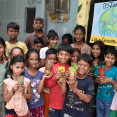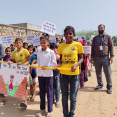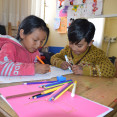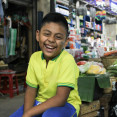
A global call to action
The International Day of Persons with Disabilities, celebrated globally on 3rd December, is a key moment to champion the rights of people with disabilities, recognise their achievements and remind us of the urgent need to work towards more inclusive societies. Here, Roz Elliott, Toybox's Programme Manager for Latin America, highlights the significant challenges faced by people with disabilities, particularly children in street situations, and shares an update on the work that Toybox and its partners are doing to ensure its projects are inclusive.
The scale of the challenge
While significant progress has been on disability rights, the available statistics paint a staggering picture of extent of the barriers faced by people with disabilities. Nearly 240 million children worldwide – 1 in 10 – have a disability. Children with disabilities are 49% more likely to have never attended school, 42% less likely to have foundational reading and numeracy skills and 32% more likely to experience severe physical punishment at home.
The links between poverty and disability have been widely documented – the poverty-disability cycle means that persons with disabilities are more likely to live in poverty, as they face significant barriers to full inclusion in society. In turn, those who live in poverty are more likely to acquire a disability which may push them further into poverty. Children with disabilities are more likely to experience violence at home and to miss out on education – factors that push them into a life living or working on the streets. Once they become street-connected, they are at even greater risk of exploitation and abuse than children without disabilities in street situations.
It is imperative that we act.
Steps towards inclusion in Toybox projects
Toybox-supported projects work towards strengthening community, local and national child protection systems, in particular seeking policy and practice change to ensure the rights of children in street situations are realised. We are on a journey towards ensuring that our projects are fully inclusive and contributing to reducing the barriers faced by children with disabilities in street situations.
Over the past year, Toybox partners have participated in training on disability inclusion, peer exchange visits to see inclusive programming in practice and started to strengthen their organisational policies. The right to identity is a key part of protecting children and Toybox partners are supporting children with disabilities who are on the streets to obtain their birth certificate and ID documents, and where possible supporting them to access additional state benefits (eg, through a disability ID card).
Transforming attitudes: A key to inclusion
Evaluations of interventions to mainstream inclusion in NGO programmes have identified changing staff and community attitudes as a critical first step towards the inclusion of people with disabilities. In my recent visit to El Salvador, I saw first-hand how quickly positive change can be achieved.

In a school in the centre of San Salvador, I met Julio (pictured above), a psychology undergraduate and a volunteer with Toybox's partner, Viva. He has been working with children and adult members of the project’s child protection committees to teach them El Salvadorean sign language. When I asked about his experience of the project, Julio explained;
“The Inclusion project is a project that will help the children in their development, as in the future they could meet Deaf people and by knowing Sign Language they will be able to provide the support they need and make a more inclusive society. The main objective is to connect the children in the world of inclusion, as some had never interacted with a Deaf person before and that makes them grow up with social awareness and learn skills that will help others in the future, it was beautiful to see that some showed a real interest in learning.”
Breaking down barriers in education
In Latin America, illiteracy is five times higher among people with disabilities and children with disabilities are more likely to drop out of school and to experience discrimination and even violence in classroom settings. Learners are persistently affected by stigma that contributes to early drop out and discourages parents from sending their children to school.
Viva work within local schools to support children in street situations to remain in education and to catch up with their peers. Through this project, children have learned practices and approaches that encourage respectful and empathetic interaction with persons with disabilities. Activities have been adapted to enable the full participation of children with disabilities. Jeimy, the project lead, shared that,
“One of the participants, Luis told us these adaptations have made him feel valued and integrated. Luis has even shared suggestions on how to make the activities more accessible which has enriched the experience for everyone”.
The project team have observed significant changes in the understanding and attitudes of mothers and caregivers who are part of the protection committees. They have shown great interest in learning sign language, breaking down communication barriers and now know and recognise the rights of people with disabilities. The protection committee, made up of parent volunteers who are mostly working in the informal economy, are keen to teach others – sharing what they have learned about inclusion with the teachers in the school and with their families and peers. Jeimy, commented,
“The project has generated a remarkable awareness among the participating children. They now understand that persons with disabilities have the same rights as themselves and deserve to be protected from any violations. The children have developed a reflective view of the needs and barriers faced by people with disabilities, from infrastructure problems to exclusionary attitudes.”
With a little support from Toybox, Viva has made significant steps towards integrating inclusion across their work. We are excited to be part of this journey and in the new year, Jeimy will be sharing the resources they’ve developed and their lessons along the way with other Toybox partners.
Through initiatives like these, Toybox and its partners are taking meaningful steps towards creating a world where children with disabilities are fully included and empowered. While the journey is ongoing, each small step brings us closer to a future where every child has the opportunity to thrive.

Pictured above: Parents and caregivers learn sign language.



